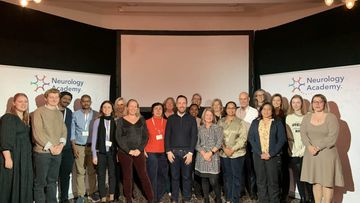Audit of MS relapse management in a district general hospital setting
 by Dr Ferghal McVerry, Consultant Neurologist, Altnagelvin Hospital
by Dr Ferghal McVerry, Consultant Neurologist, Altnagelvin HospitalDr Ferghal McVerry is the winner of the first Multiple Sclerosis Academy MasterClass Project Award for his audit of multiple sclerosis relapse management in a district general hospital setting. The intermodule project is an integral part of the MasterClass. Course participants choose an area of interest which might be around service delivery, patient or drug management and present their findings at Module 2 to the faculty and other participants who select the winner.
Management of multiple sclerosis (MS) is a rapidly evolving field with an array of new and upcoming treatment options now available, providing challenges for general neurologists and MS specialist services alike. Guidelines from NICE for managing MS relapses focus on administration of steroids, oral or IV, while also excluding potential mimics such as infections. An evidence base exists for referral to physiotherapy while the concept of aiming for “no evidence of disease activity” challenges MS services to respond to disease progression in the form of relapses.Dr McVerry is a Consultant Neurologist at Altnagelvin Hospital, a district general hospital providing general neurology and some subspecialty outpatient clinics and ward liaison services in Northern Ireland. Most outpatient MS care is provided by specialist nursing teams and visiting neurologists, but a specific MS clinic has not been commissioned. His subspecialty interest is stroke.
Method
We undertook a retrospective review of case notes for patients treated as inpatient or outpatient during 2016 at a single district general hospital for an MS relapse, documenting adherence to NICE Guidelines, evidence for allied health professional referral, use of MRI to measure disease activity, and if a discussion on disease modifying treatment (DMT) escalation was had with the patient given that a clinical relapse had occurred despite being on a DMT.Results
Fifty-seven relapses were managed with oral or IV steroids in 2016. Contact was usually via phone call from the patient /caregiver to the MS nursing service describing relapse symptoms (n=34). Only five relapse episodes were managed as an inpatient, although intravenous steroid administration was more common than oral (n=45 vs 12). Before treatment, infection was screened for using urinalysis (n=35) and/or blood white cell count (n=25). Steroids were prescribed by a non-MS neurologist in the majority of cases (n=40). Only six patients received physiotherapy, five of whom were inpatients. Relapse symptoms prompted MRI to be undertaken in only eight cases and a change in DMT occurred in 12 cases. The cohort demonstrated evidence of active disease due to the fact that 32 had also been prescribed steroids for relapse symptoms in the previous 12 months. Post-relapse follow up was infrequently organised (n=8).Discussion & learning points
Our audit highlighted several areas of practice that require attention. Although NICE guidelines were largely followed, we tended to use IV rather than oral steroids. Other than steroid prescription, other aspects of MS relapse care were frequently neglected. Physiotherapy referral was rare despite the fact that most relapses comprised motor symptoms. Consideration of a change in DMT either using MRI to reassess lesion burden, or with specific clinical follow up was unusual in our experience. In fact, the patient group who were most likely to have physiotherapy input, MRI obtained, discussion regarding and/or change of DMT were those patients who were managed in the inpatient setting. Furthermore, there were important governance issues highlighted over the prescription of steroids by non-MS neurologists in the majority of cases, as most MS outpatient care locally is via visiting rather than resident neurologists.We aim to discuss these results with trust management as a priority in order to create a specific MS relapse pathway in which patients are seen by an MS nurse/neurologist prior to steroid prescription, MRI can be accessed rapidly and with specific access to allied health professional input. As those managed in the inpatient setting at present are most likely to receive the elements of good care, it is imperative that we provide the same level of care to all MS patients in our trust.Discussing the results at the Multiple Sclerosis Academy MasterClass permitted comparison of relapse management services in different centres and also provided valuable feedback that will be incorporated into our planned MS relapse pathway.Correspondence to: ferghalmcverry@doctors.org.ukRelated articles

07 Oct 2024
Knowledge
Key highlights from ECTRIMS 2024
Encouraging excellence, developing leaders, inspiring change
MS Academy was established five years ago and in that time has accomplished a huge amount. The six different levels of specialist MS training are dedicated to case-based learning and practical application of cutting edge research. Home to national programme Raising the Bar and the fantastic workstream content it is producing, this is an exciting Academy to belong to.

